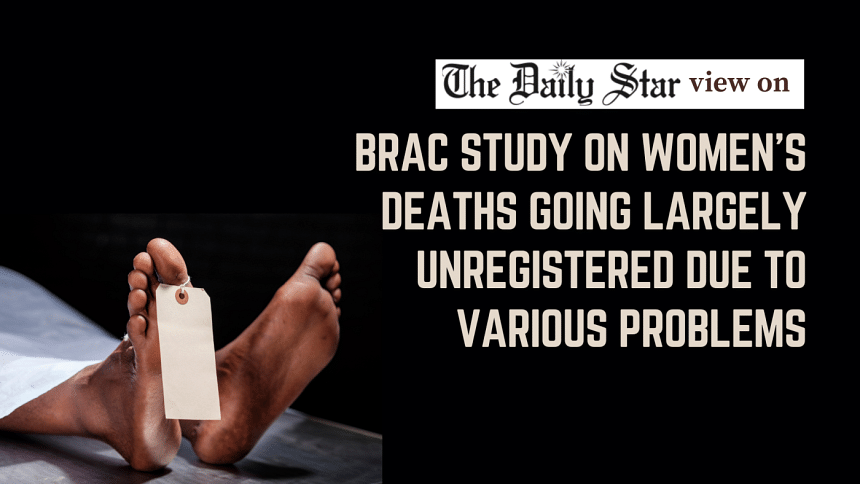Is a woman’s death worth less?

We are alarmed to learn of the persistence of a silent injustice that few people still seem to know or care about in Bangladesh: the neglect of women when it comes to recording their deaths. While death registration regardless of gender has yet to catch on in the country, despite efforts to popularise it, women seem to be particularly excluded from this process. A study by the BRAC James P Grant School of Public Health has now revealed how widespread this problem is.
Conducted in Rangpur division, the study shows how societal perceptions and systemic hurdles continue to erase women from public records. This is also backed by the latest official data that says that 26 percent of male deaths nationwide are registered, compared to only five percent of female deaths. In Rangpur, only 32 percent of all deaths recorded in 2023-24 were of women. The situation may turn grimmer in certain districts. In Panchagarh, for example, just four percent of female deaths were registered, according to researchers. Clearly, the problem is more acute in rural and low-income areas, even though the Birth and Death Registration Act, 2004 makes it mandatory to register a person's death within 45 days.
The BRAC study has identified multiple barriers to female death registration, including lack of property ownership. In most families, a woman's death is deemed unworthy of registration unless she owned land or financial assets or had a pension or savings account that could be claimed. As one respondent bluntly put it, "My mother didn't have any land-related matters… that's why I didn't do it." The perception that a woman must leave behind something "useful" to justify her death being recorded is deeply troubling.
The BRAC study has identified multiple barriers to female death registration, including lack of property ownership. In most families, a woman's death is deemed unworthy of registration unless she owned land or financial assets or had a pension or savings account that could be claimed. As one respondent bluntly put it, "My mother didn't have any land-related matters… that's why I didn't do it." The perception that a woman must leave behind something "useful" to justify her death being recorded is deeply troubling.
Other barriers include low public awareness, limited digital literacy, lack of essential documents such as digital birth certificates, and inefficiencies or coordination failures among relevant government agencies. These social and institutional problems reinforce one another, creating an environment where countless women die without being counted, thus reinforcing the marginalisation they often experience in life. While the lack of death registration is not unique to Bangladesh, with 69 lakh deaths going unregistered every year across Asia and the Pacific, we surely rank among the worst performers. As experts say, when a death is not recorded, the public health system loses crucial data on causes of death, compromising its ability to respond to health crises.
We, therefore, must ensure that every death—of both men and women—is registered without exception. To that effect, experts have made a number of recommendations that should be taken seriously. First, we must raise awareness about the importance of death registration, with specific focus on gender-sensitive messaging. The registration process itself must be simplified and made free of cost, especially for low-income and rural communities. Registration offices should also be better equipped to improve service delivery. Health professionals, who are often the first point of contact when a death occurs, also have a vital role to play as they can inform families about the importance of registration and help them navigate the required procedures.


 For all latest news, follow The Daily Star's Google News channel.
For all latest news, follow The Daily Star's Google News channel. 






Comments